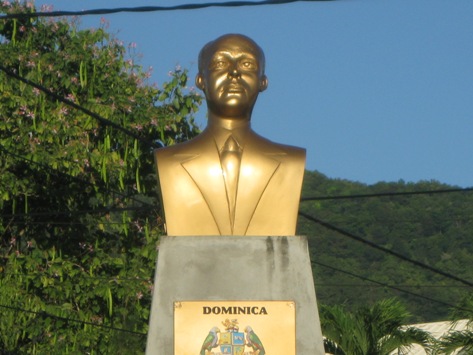 Print this page
Print this page
Dominica’s democracy at the crossroads
By Gabriel Christian
January 26, 2012 11:25 a.m.

Bust of former representative Cecil Edgar Rawle at Federation Drive, Roseau. |
Washington, DC (TDN) —- A forest -in all its splendor- is often best appreciated from a distance. From a distance all one sees is oft times a seamless green blanket, in undulating beauty. However, it is only in the midst of the forest – and close up – that one appreciates the coiled vines; rough bark; and the towering tree trunks which support the lofty leaf-laden branches.
So too with a democracy, one can only fully understand what constitutes its gross anatomy by grasping a deeper understanding of its roots and what makes it work.
What do we teach our people, no less our children, of the genesis of Dominica’s democracy? What does the average person on Dominica know of that man whose bust sits atop the plinth at the top of Federation Drive, at the center of its roundabout? That bust of Cecile Rawle is really a tribute to his role in fostering our democracy.
In 1920s colonial Dominica an unelected legislature ruled our affairs. The administrator installed by Britain reigned supreme on-island and the average citizen had no say in parliament. Confronted with that inequity, British trained attorney Cecile Rawle and local planter/businessman, John Baptiste “JB” Charles (the father of Dame Eugenia Charles) formed the Dominica Representative Government Association.
Their advocacy of voting rights for Dominicans brought locals into parliament; both Rawle and Charles later being elected to serve. By 1945 the working class had a champion in the Dominica Trade Union; in 1951 universal adult suffrage was born of that long struggle – Dominicans now had the right to vote, without regard to their property holdings. A new democracy was being born.
In the 1950s, 1960s and 1970s we had a flowering of new civil society institutions: the Lions Club, the Social League, Dominica Employers Federation, the credit union movement, the Dominica Amalgamated Workers Union, the Civil Service Association, the Young Christian Workers movement, the Jaycees, the Peoples Action Theater, the Dominica Amateur Sports Association (DASA), Movement for a New Dominica, Tradibelle, United Student Council, the Dominica Federation of Students, the National Youth Council, The Dominica Human Rights Society, the St Alphonsus Youth Group, the Lechelle Youth Group of Grandbay and many other youth groups too numerous mention.
Research reveals an annual banquet was held at Governor’s House in 1950s Dominica– with support of the tiny but vibrant Dominica bar Association – to benefit programs for Dominica’s youth population. All these organizations were non-governmental, and served to buttress the rights of the ordinary citizen; often acting as a brake on government excesses, or errant conduct where it arose.
Where are we now? What are the costs to a society when its civil society organizations atrophy; wither away and die?
In a case of criminal assault upon peaceful citizens by the Prime Minister’s close associate who points a pistol at their heads, the most astounding thing happens. In the middle of the trial, the judge discovers that there is no pistol to be found in evidence; it has been handed back to the accused due to the intervention of “higher authority.”
The judge bravely orders that the pistol be found. Later, after the trial results in conviction of the Prime Ministers associate, the judge discovers that his services are no longer needed by the state; with his contract not renewed, he is off the bench.
We know that such alarming conduct is not our tradition. We know that when the three masqueraders were burnt in that tragic carnival fire of February 25, 1963, a coroners’ inquest was held within days and “foul play” was found as the likely cause.
Within months a commission of inquiry was empanelled, Scotland trained Commander Slater was called in to investigate, and witnesses subpoenaed to testify; all overseen by an impartial Grenadian Judge E.L. St. Bernard. That no trial was pursued to finality does not erase the fact that speedy steps were taken to assure the public that rule of law and due process were in place.
Today, going on two years after the attempted murder on Christmas Day 2010 of retired Judge Glenworth Emmanuel and his wife Greta, we have silence. Mr. Emmanuel was then, as now, involved in a lawsuit with the Prime Minister’s lawyer, Isidore.
Despite a confession by one Denny Shillingford who claimed to have thrown the fire bomb, and the flight of the person accused as the diabolical mastermind who paid him to do so, we have silence. Where is our government? Where is our independent judiciary? What of the attorney general? Are coroners’ inquest still held on island?
Is that silence due to the fact that the alleged mastermind is linked to the Prime Minister? More troubling have been the statements of the government’s legal advisor and know-all, Tony Astaphan, whose public utterances infer that the attempted murder allegation is lacking in credibility and should be closed.
Are we to accept the public utterances of Tony Astaphan as the sum total of how justice is done on Dominica? What macabre value construct have we allowed to metastasize, as some cancerous growth, in our beloved homeland? What has happened to the procedural and institutional framework, born of an independent judiciary and police force, upon which the population can rely?
In the lead up to carnival 2012, it would seem that the torch of liberty, and the quest for truth, resides in the hands of our valiant calypsonians and talk show hosts on WICE Q95.
Continue Reading

| 




